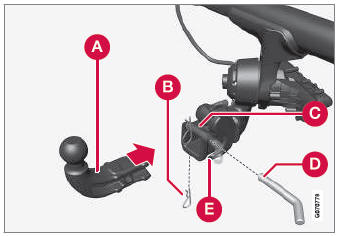Volvo XC90: Starting and driving / Braking on wet roads. Braking on salted roads
Braking on wet roads
Prolonged driving in heavy rain without braking may cause braking effect to be slightly delayed the first time the brakes are applied. This may also occur after washing the vehicle. It will then be necessary to apply greater pressure to the brake pedal. You should therefore maintain a greater distance to the vehicle ahead.
Firmly apply the brakes after washing the vehicle or driving on wet roads. This helps warm up the brake discs, enabling them to dry more quickly and protecting them against corrosion. Consider the current traffic situation when braking.
Braking on salted roads
When driving on salted roads, a layer of salt may form on the brake discs and brake pads. This could increase stopping distance. Maintain an extra large safety distance to the vehicle ahead. Make sure to also:
- Apply the brakes from time to time to help remove salt. Make sure braking does not pose a risk to any other road users.
- Gently apply the brakes when you have finished driving and before driving again.
 Brake Assist System
Brake Assist System
The brake enhancing system, (BAS1), helps increase braking force
and can thereby reduce braking distance.
The system monitors the driver's braking habits and increases braking force when
necessary...
 Maintenance of the brake system
Maintenance of the brake system
Regularly check the brake system components for wear.
To keep the vehicle as safe and reliable as possible, follow the Volvo service
schedule specified in the Warranty and Maintenance Records Information booklet...
Other information:
Volvo XC90 2015-2026 Owners Manual: Updating apps
Apps can be updated when the vehicle is connected to the Internet. NOTE Data downloading can affect other services such as transfer data, e.g. web radio. If the affect on other services is experienced as problematic, the download can be interrupted...
Volvo XC90 2015-2026 Owners Manual: Fuses and fuseboxes
All electrical functions and components are protected by a number of fuses in order to protect the vehicle's electrical system from damage by short circuiting or overloading. WARNING Never use a foreign object or a fuse with a higher amperage than that specified to replace a fuse...

